Food Waste Reduction: A Test of Three Consumer Awareness Interventions
Abstract
1. Introduction
2. Materials and Methods
2.1. Research Design
2.2. Recruitment
2.3. Waste Audits
2.4. Surveys
2.5. Focus Groups
2.6. Data Analysis and Limitations
3. Results
3.1. Food Waste Quantities from Waste Audits
3.2. Campaign Participation Rates
3.2.1. The Information Campaign Group
3.2.2. The Community Workshop Group
Ali: “I think it’s again going back to the fatigue. There are a million videos on YouTube, DIYs [referring to do-it-yourself videos] …maybe the messaging and marketing made it seem that it does not matter, there’s nothing new.”
Gabriela: “Yeah, I remember I saw that email, but I’m doing my BA and I said no way because of the timing. Now that you ask the question, if it was recorded like in a short online course, it would definitely be something that I would watch maybe during the weekend, like 10 min.”
3.2.3. Gamification Group
Kristina: “One factor that made me play them was that they were doable and not hours long. I learned new things with the game and remembered questions.”
Susan: “Playing on your phone and tablet is much easier. The other thing is that you get reminded about the behaviour of reducing food every week even if you don’t remember the numbers necessarily and the handouts… you start to keep track of what you are doing.”
Sherry: “I would get kind of upset when I got a wrong answer or something. Call my husband, say come here, what do you think of this? …So yeah, it was good. I enjoyed it very much. I was sorry when it ended, I really was.”
3.3. Changes in Self-Reported Food Wasting
“We used to have vegetables that would go bad before we could get to them because I’d forget about them in the little crisper drawer. So, what I’ve been trying to do is cause you’ve got two drawers, the new stuff goes in the right and the stuff that I’ve had for a little bit goes in the left so I can try to keep tabs on it. It’s really helped a lot.”
3.4. Changes in Self-Reported Awareness of Food Waste
4. Discussion and Conclusions
Supplementary Materials
Author Contributions
Funding
Conflicts of Interest
Appendix A
| Category | Description | Edible Food Waste Examples | Inedible Food Waste Examples |
|---|---|---|---|
| Vegetables and Salad | Vegetables according to culinary definition. Includes mushrooms and fungi, roots and tubers, pulses and legumes, and seaweeds. | Eggplant, bean, broccoli, cabbage, carrot (including peel), cauliflower, celery, zucchini, cucumber, lettuce, mushroom, onion, pea, pepper, potato (including peel), spinach, sprouts, squash, corn, tomato, salad mix, mixed vegetables. | Tops of root vegetables (e.g., carrots), onion skin, hard stalks (e.g., pepper, lettuce, squash), hard vegetable peels (e.g., winter squash). |
| Fruit | Fruit according to culinary definition. | Apple (including peel), banana, kiwi, melon, orange, pear (including peel), pineapple, mango, grapes, berries, stone fruits, citrus fruits, avocado, mixed fruits. | Apple core, banana peel, hard/waxy fruit peels (e.g., melon, mango), vines (e.g., grape or berries), citrus peel, stone fruit pits, avocado peel and seed. |
| Meat and Fish | All types of meat, poultry, and game products, in pieces and cuts or comminuted, fresh, and processed. Includes fresh fish and various processed fish products. Includes aquatic vertebrates (fish and aquatic mammals), aquatic invertebrates, and shellfish. | Pork, ham, bacon, beef, lamb, chicken, turkey, duck, game meat, deli meats, processed meats, fish, jellyfish, clams, snails, shrimp, crab, lobster, sea urchins, sea cucumbers. | Bones, shells, tendon, fat from cuts of meat. |
| Bakery | All savory baked goods and breads. Includes uncooked dough or batter. Does not include sweet bakery items and processed snack foods. | Bread, bagels, scones, soft pretzels, croissants, pancakes, naan, filo, tortilla, breadsticks, dough, pancake batter, croutons, crisp breads, breadsticks, breadcrumbs. | None. |
| Dairy/Eggs | Dairy products that are derived from the milk of any milking animal (e.g., cow, sheep, goat, buffalo). Fresh in-shell eggs, products that may substitute for fresh eggs, and other egg products. Does not include ice cream. | Milk, cheese, cream, yogurt, kefir, sour cream. | Egg shell, wax coating on cheese. |
| Prepared Foods and Leftovers | Foods prepared as meals or components of meals that are mixtures of multiple categories of food. These include pre-prepared foods which require minimal preparation by the consumer (e.g., heating, thawing, rehydrating). Includes products composed primarily of protein that are derived from soybeans or from other sources. | Soup, canned soup, stew, sandwich, pasta with sauce, stir fry with meat and vegetables, salad with dressing, instant noodles, savory pie, burrito, casserole, soy burger patty, frozen dinner. | None. |
| Desserts | All sweet items that could be consumed at the end of a meal or a snack. Includes sweet bakery items. | Cake, cheesecake, pudding, jelly, donut, sweet pastries, sweet pies, strudel, fruit crumble, ice cream, mousse. | None. |
| Staples | Unprocessed and various processed forms of cereal and cereal-based products. Includes cooked cereal-based products if they have not been mixed with other types of food. | Breakfast cereal, flour, pasta, rice, corn flour, noodles, couscous. | Husks from milling. |
| Condiments/Sauces/Spices | Substances added to food to enhance its aroma and taste. Includes certain prepared foods that act as sauces or condiments. | Salt and salt substitutes, soy sauce, herbs, spices, seasonings, vinegar, mustard, ketchup, salsa, mayonnaise, gravy, dips, pickles, olives, sugar, honey, jam, peanut butter. | None. |
| Oil/Fat | All fat-based products that are derived from vegetable, animal, or marine sources, or their mixtures. Does not include fat from cuts of meat. | Butter, margarine, lard, suet, vegetable oils, flavoured oils. | None. |
| Candy and Snacks | All cocoa and chocolate products, other candy products, chewing gum, and decorations and icings. All types of savory snack foods, nuts, and seeds. | Chocolate, candy, chewing gum, cereal bar, cookies, nuts, seeds, trail mix, popcorn, chips, crackers. | Nut and seed shells. |
| Drinks | Alcoholic and non-alcoholic beverages, excluding dairy products. | Bottled water, soft drinks, coffee, fruit juice, tea, alcohol, smoothies. | Coffee grounds, tea bags. |
| Other | Items that do not fit into other categories or serve a special purpose. Includes items that are indistinguishable. | Baby food, baby formula, mixed semi-solid food, draining from canned and bottled food. | None. |
| Non-Food | Anything that is not food or an inedible part of food. | N/A | N/A |
Appendix B
| Control | Info | Comm | Game | Total | Chi2 Test | p Value | |
|---|---|---|---|---|---|---|---|
| Gender | (n = 59) | (n = 50) | (n = 57) | (n = 61) | |||
| Male | 42% | 24% | 41% | 36% | 36% | ||
| Female | 58% | 76% | 59% | 64% | 64% | 4.77 | 0.19 |
| Age | (n = 56) | (n = 49) | (n = 57) | (n = 61) | |||
| 18–34 | 30% | 20% | 23% | 20% | 23% | ||
| 35–64 | 34% | 49% | 56% | 54% | 48% | ||
| 65+ | 36% | 31% | 21% | 26% | 28% | 7.6 | 0.27 |
| HH Size | |||||||
| HH 1 | 2% | 2% | 9% | 5% | 5% | ||
| HH 2 | 24% | 29% | 16% | 32% | 25% | ||
| HH 3+ | 75% | 69% | 75% | 63% | 70% | 8.17 | 0.23 |
| Number of Children | |||||||
| None | 55% | 67% | 47% | 56% | 56% | ||
| 1+ | 45% | 33% | 53% | 44% | 44% | 3.97 | 0.26 |
| Total | |||||||
| High School or Less | 25% | 23% | 27% | 20% | 24% | ||
| Post-Secondary | 75% | 77% | 73% | 80% | 76% | 0.89 | 0.83 |
| Total | |||||||
| <$40K | 6% | 13% | 16% | 5% | 11% | ||
| $40K–$100K | 42% | 40% | 44% | 47% | 44% | ||
| >$100K | 52% | 47% | 40% | 47% | 46% | 3.91 | 0.69 |
| Total |
References
- Thyberg, K.L.; Tonjes, D.J. Drivers of food waste and their implications for sustainable policy development. Resour. Conserv. Recycl. 2016, 106, 110–123. [Google Scholar] [CrossRef]
- Von Massow, M.; Parizeau, K.; Gallant, M.; Wickson, M.; Haines, J.; Ma, D.W.L.; Wallace, A.; Carroll, N.; Duncan, A.M. Valuing the Multiple Impacts of Household Food Waste. Front. Nutr. 2019, 6, 143. [Google Scholar] [CrossRef]
- Reynolds, C.J.; Mirosa, M.; Clothier, B. New Zealand’s Food Waste: Estimating the Tonnes, Value, Calories and Resources Wasted. Agric. 2016, 6, 9. [Google Scholar] [CrossRef]
- Willett, W.; Rockström, J.; Loken, B.; Springmann, M.; Lang, T.; Vermeulen, S.; Garnett, T.; Tilman, D.; Declerck, F.; Wood, A.; et al. Food in the Anthropocene: the EAT-Lancet Commission on healthy diets from sustainable food systems. Lancet 2019, 393, 447–492. [Google Scholar] [CrossRef]
- Jagau, H.L.; Vyrastekova, J. Behavioral approach to food waste: an experiment. Br. Food J. 2017, 119, 882–894. [Google Scholar] [CrossRef]
- Byker, C.J.; Farris, A.R.; Marcenelle, M.; Davis, G.C.; Serrano, E.L. Food Waste in a School Nutrition Program After Implementation of New Lunch Program Guidelines. J. Nutr. Educ. Behav. 2014, 46, 406–411. [Google Scholar] [CrossRef] [PubMed]
- Lazell, J. Consumer food waste behaviour in universities: Sharing as a means of prevention. J. Consum. Behav. 2016, 15, 430–439. [Google Scholar] [CrossRef]
- Devaney, L.; Davies, A.R. Disrupting household food consumption through experimental HomeLabs: outcomes, connections, contexts. J. Consum. Cul. 2017, 17, 823–844. [Google Scholar] [CrossRef]
- Schmidt, K. Explaining and promoting household food waste-prevention by an environmental psychological based intervention study. Resour. Conserv. Recycl. 2016, 111, 53–66. [Google Scholar] [CrossRef]
- Priefer, C.; Jörissen, J.; Bräutigam, K.-R. Food waste prevention in Europe—A cause-driven approach to identify the most relevant leverage points for action. Resour. Conserv. Recycl. 2016, 109, 155–165. [Google Scholar] [CrossRef]
- ReFED. A Roadmap to Reduce U.S. Food Waste by 20 Percent. Retrieved October 6th 2019. 2016. Available online: https://www.refed.com/downloads/ReFED_Report_2016.pdf (accessed on 12 December 2019).
- Gunders, D.; Wedel, C. Save the Food. 2016. Available online: https://www.epa.gov/sites/production/files/2016–05/documents/gunders_and_wedel_april_2016.pdf (accessed on 6 October 2019).
- EPA. Food: Too Good To Waste—An Evaluation Report for the Consumption Workgroup of the West Coast Climate and Materials Management Forum. 2016. Available online: https://www.epa.gov/sustainable-management-food/evaluation-report-campaigns-using-food-toogood-waste-toolkit (accessed on 12 December 2019).
- National Zero Waste Council. National Food Waste Reduction Strategy. 2017. Available online: http://www.nzwc.ca/focus/food/national-food-wastestrategy/Documents/NFWRS-Strategy.pdf (accessed on 12 December 2019).
- Amis de la Terre de Québec. Mobiliser la population québécoise pour réduire le gaspillage alimentaire: un enjeu de développement durable. 2016. Available online: http://www.sauvetabouffe.org/wp-content/uploads/2016/09/Mémoire-final-mars-2016.pdf (accessed on 12 December 2019).
- Abrahamse, W.; Steg, L.; Vlek, C.; Rothengatter, T. A review of intervention studies aimed at household energy conservation. J. Environ. Psychol. 2005, 25, 273–291. [Google Scholar] [CrossRef]
- Parizeau, K.; Von Massow, M.; Martin, R. Household-level dynamics of food waste production and related beliefs, attitudes, and behaviours in Guelph, Ontario. Waste Manag. 2015, 35, 207–217. [Google Scholar] [CrossRef] [PubMed]
- Steg, L.; Vlek, C. Encouraging pro-environmental behaviour: An integrative review and research agenda. J. Environ. Psychol. 2009, 29, 309–317. [Google Scholar] [CrossRef]
- Reynolds, C.; Goucher, L.; Quested, T.; Bromley, S.; Gillick, S.; Wells, V.K.; Evans, D.; Koh, L.; Kanyama, A.C.; Katzeff, C.; et al. Review: Consumption-stage food waste reduction interventions—What works and how to design better interventions. Food Policy 2019, 83, 7–27. [Google Scholar] [CrossRef]
- Aschemann-Witzel, J.; De Hooge, I.; Amani, P.; Bech-Larsen, T.; Oostindjer, M. Consumer-Related Food Waste: Causes and Potential for Action. Sustainability 2015, 7, 6457–6477. [Google Scholar] [CrossRef]
- Davies, J.; Foxall, G.; Pallister, J. Beyond the intention–behaviour mythology: an integrated model of recycling. Mark. Theor. 2002, 2, 29–113. [Google Scholar] [CrossRef]
- Stöckli, S.; Niklaus, E.; Dorn, M. Call for testing interventions to prevent consumer food waste. Resour. Conserv. Recycl. 2018, 136, 445–462. [Google Scholar] [CrossRef]
- Barr, S. Environmental action in the home: investigating the ‘value-action’ gap. Geography 2016, 91, 43–54. [Google Scholar]
- Visschers, V.H.; Wickli, N.; Siegrist, M. Sorting out food waste behaviour: A survey on the motivators and barriers of self-reported amounts of food waste in households. J. Environ. Psychol. 2016, 45, 66–78. [Google Scholar] [CrossRef]
- Young, W.; Russell, S.V.; Robinson, C.A.; Barkemeyer, R. Can social media be a tool for reducing consumers’ food waste? A behaviour change experiment by a UK retailer. Resour. Conserv. Recycl. 2017, 117, 195–203. [Google Scholar] [CrossRef]
- Shaw, P.J.; Smith, M.M.; Williams, I.D. On the Prevention of Avoidable Food Waste from Domestic Households. Recycling 2018, 3, 24. [Google Scholar] [CrossRef]
- Van Der Werf, P.; Seabrook, J.A.; Gilliland, J.A. “Reduce Food Waste, Save Money”: Testing a Novel Intervention to Reduce Household Food Waste. Environ. Behav. 2019. [Google Scholar] [CrossRef]
- Elimelech, E.; Ayalon, O.; Ert, E. What gets measured gets managed: A new method of measuring household food waste. Waste Manag. 2018, 76, 68–81. [Google Scholar] [CrossRef]
- Quested, T.E.; Parry, A.D.; Easteal, S.; Swannell, R. Food and drink waste from households in the UK. Nutr. Bull. 2011, 36, 460–467. [Google Scholar] [CrossRef]
- Yamakawa, H.; Williams, I.; Shaw, P.; Watanabe, K. Food waste prevention: lessons from the Love Food Hate Waste campaign in the UK. In Proceedings of the 16th International Waste Management and Landfill Symposium, S. Margherita di Pula, Sardinia, Italy, October 2017; pp. 2–6. [Google Scholar]
- Bandyopadhyay, J.; Dalvi, G. Can interactive installations bring about behaviour change? Using interactive installation to change food waste behaviours. In International Conference on Research into Design; Springer: Berlin, Germany, 2017. [Google Scholar]
- Lim, V.; Funk, M.; Marcenaro, L.; Regazzoni, C.; Rauterberg, M. Designing for action: An evaluation of Social Recipes in reducing food waste. Int. J. Hum.-Comput. Stud. 2017, 100, 18–32. [Google Scholar] [CrossRef]
- Comber, R.; Thieme, A. Designing beyond habit: opening space for improved recycling and food waste behaviors through processes of persuasion, social influence and aversive affect. Pers. Ubiquitous Comput. 2013, 17, 1197–1210. [Google Scholar] [CrossRef]
- Ganglbauer, E.; Fitzpatrick, G.; Comber, R. Negotiating food waste: using a practice lens to inform design. ACM Trans. Comput. Interact. 2013, 20, 1–25. [Google Scholar] [CrossRef]
- Tobon, S.; Ruiz-Alba, J.L.; García-Madariaga, J. Gamification and online consumer decisions: Is the game over? Decis. Support Syst. 2019. [Google Scholar] [CrossRef]
- Johnson, D.; Deterding, S.; Kuhn, K.-A.; Staneva, A.; Stoyanov, S.; Hides, L. Gamification for health and wellbeing: A systematic review of the literature. Internet Interv. 2016, 6, 89–106. [Google Scholar] [CrossRef]
- Hamari, J.; Koivisto, J.; Sarsa, H. Does Gamification Work? A Literature Review of Empirical Studies on Gamification; IEEE: Piscataway, NJ, USA, 2014. [Google Scholar]
- Johnson, D.; Horton, E.; Mulcahy, R.; Foth, M. Gamification and serious games within the domain of domestic energy consumption: A systematic review. Renew. Sustain. Energy Rev. 2017, 73, 249–264. [Google Scholar] [CrossRef]
- WRAP (Waste and Resources Action Programme). Household Food and Drink Waste in the UK. WRAP, UK. 2009. Available online: https://www.wrap.org.uk/sites/files/wrap/Household_food_and_drink_waste_in_the_UK_-_report.pdf (accessed on 19 January 2020).
- FLWP (Food Loss and Waste Protocol). Food Loss and Waste Accounting and Reporting Standard (Version 1.0). Washington DC: World Resources Institute. 2016. Available online: https://www.wbcsd.org/Programs/Food-and-Nature/Food-Land-Use/Climate-Smart-Agriculture/Resources/Food-Loss-and-Waste-Accounting-and-Reporting-Standard (accessed on 19 January 2020).
- Newey, W. Course Materials for 14.386 New Econometric Methods, MIT Open CourseWare. Massachusetts Institute of Technology. Retrieved January 18th 2020. 2007. Available online: https://ocw.mit.edu/courses/economics/14–386-new-econometric-methods-spring-2007/readings/treatment_effect.pdf (accessed on 19 January 2020).
- Hebrok, M.; Boks, C. Household food waste: Drivers and potential intervention points for design—An extensive review. J. Clean. Prod. 2017, 151, 380–392. [Google Scholar] [CrossRef]
- Qi, D.; Roe, B.E. Household Food Waste: Multivariate Regression and Principal Components Analyses of Awareness and Attitudes among U.S. Consumers. 2016. Available online: https://journals.plos.org/plosone/article?id=10.1371/journal.pone.0159250 (accessed on 19 January 2020).
- Van der Werf, P. Single Family Curbside Waste and Participation Audit. 2cg Waste Management Consulting Services. London, Ontario. 2016. Available online: http://thecif.ca/wp-content/uploads/2016/09/873-Toronto_Final_Report.pdf (accessed on 19 January 2020).
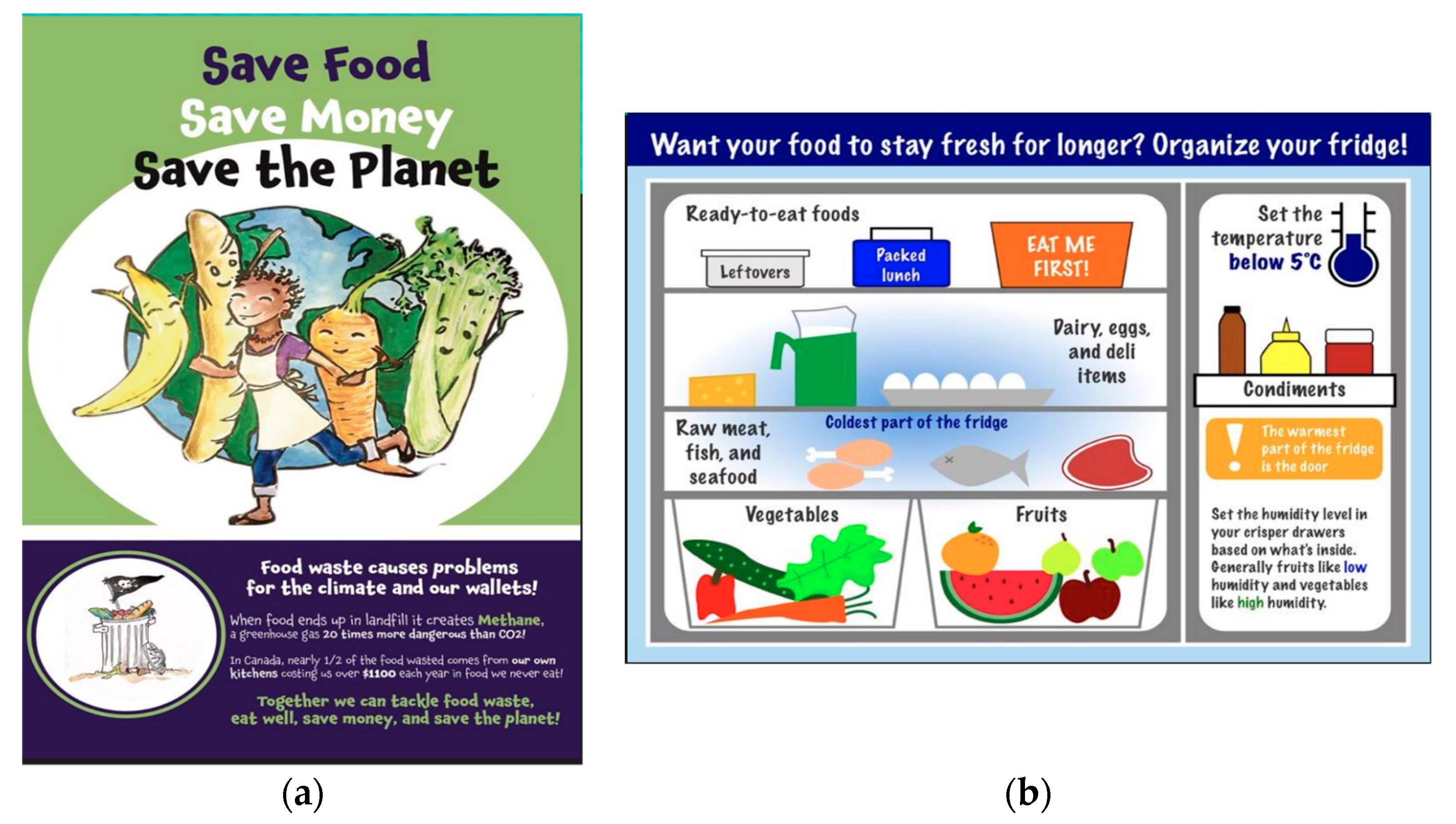
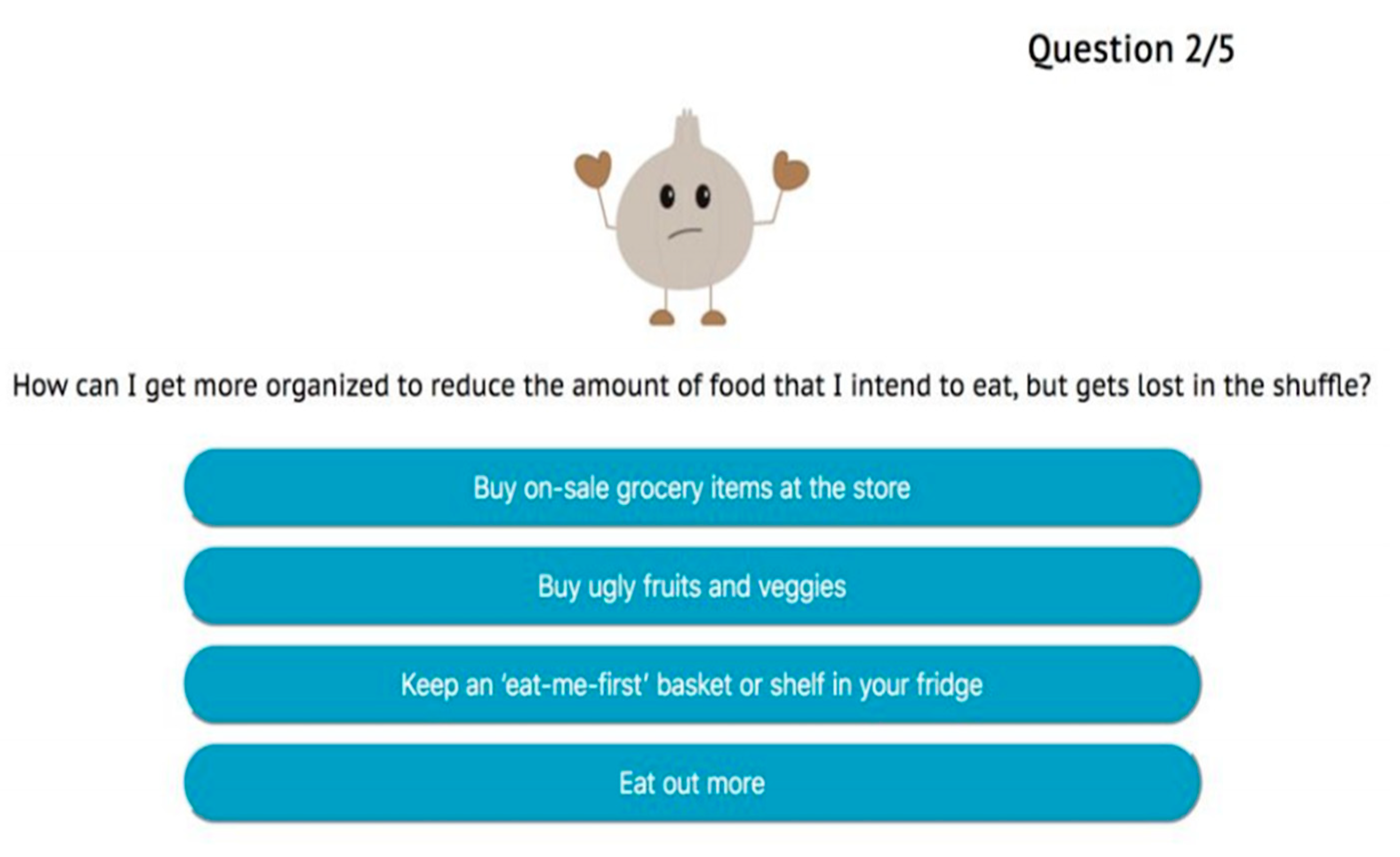
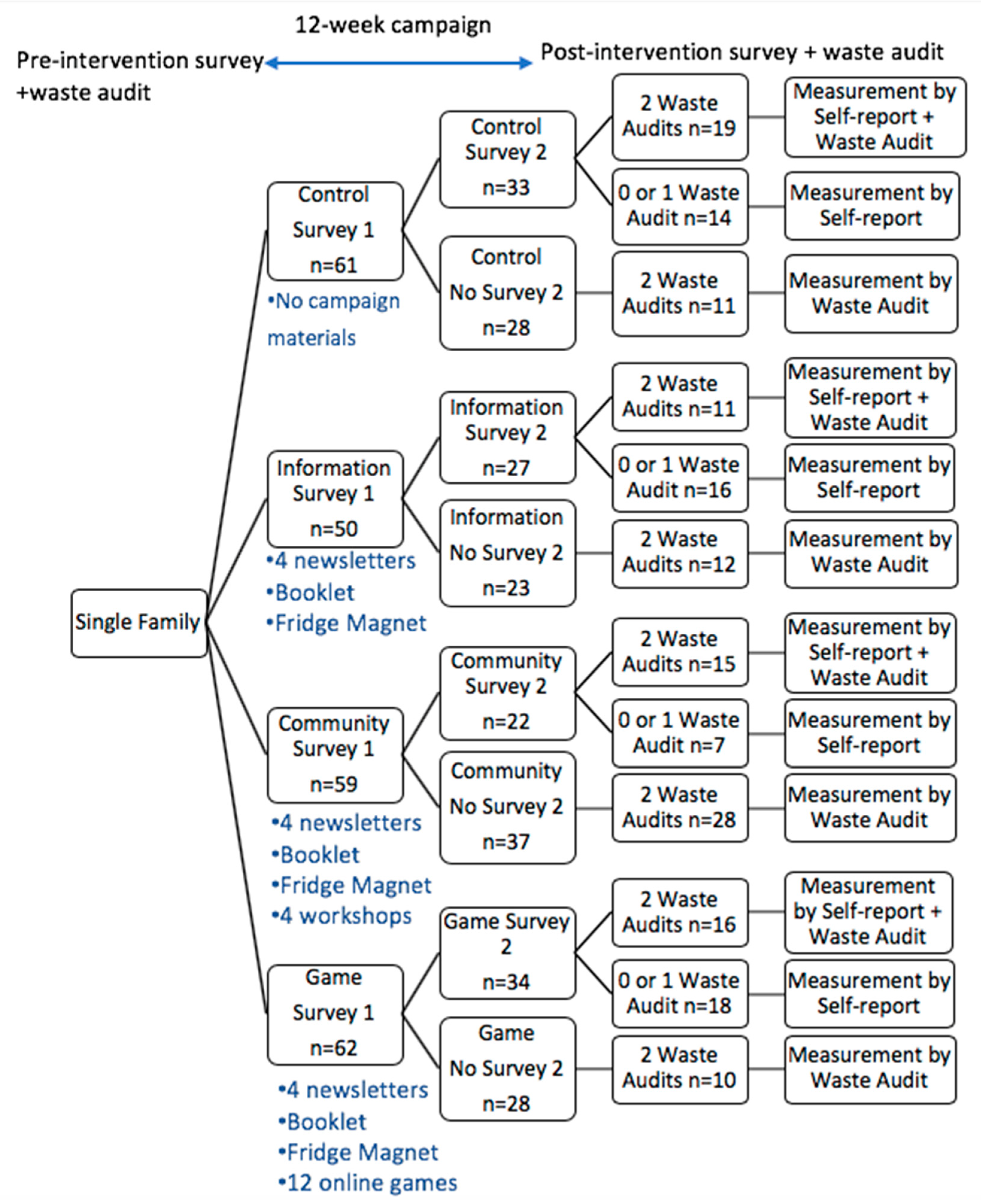
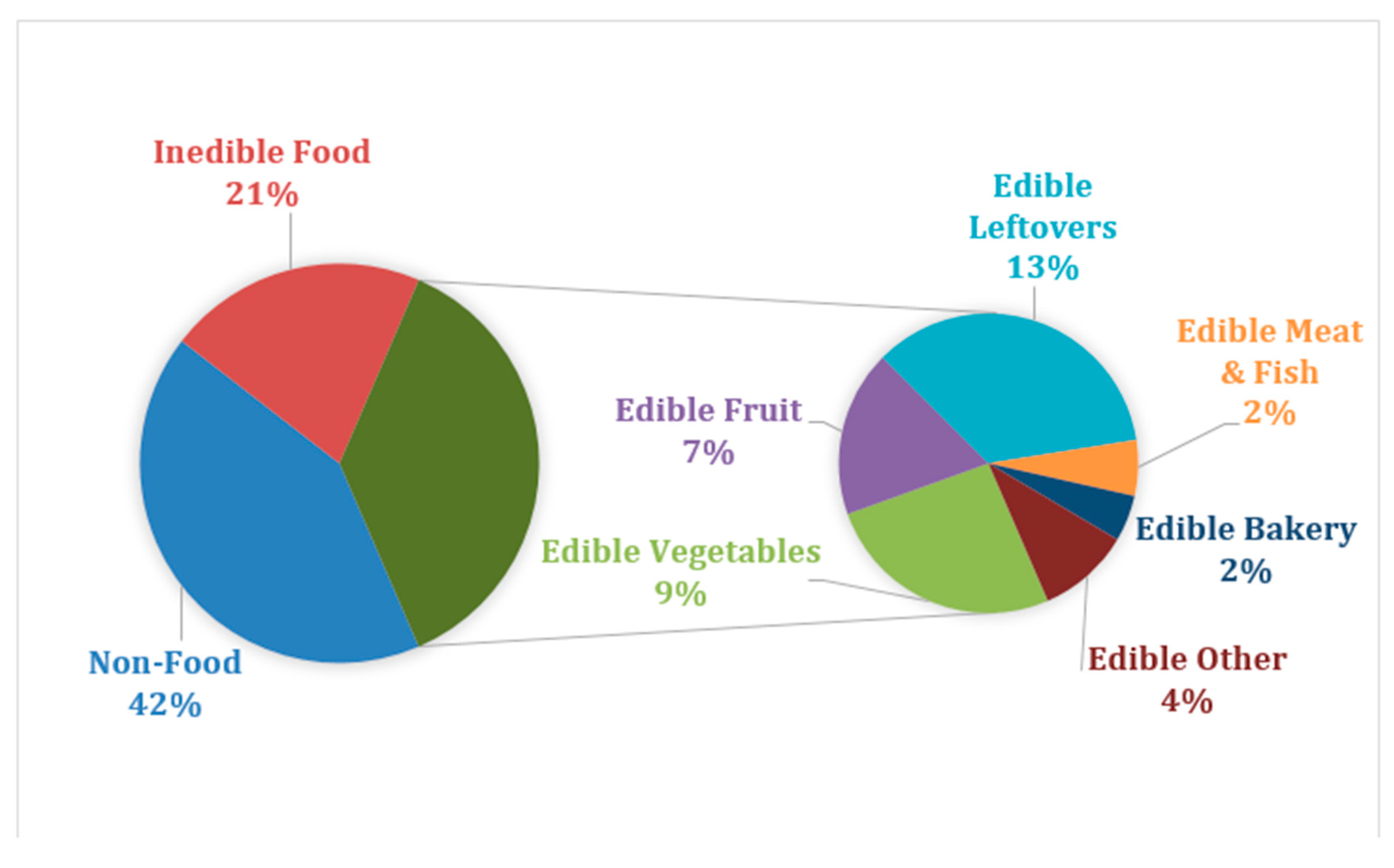
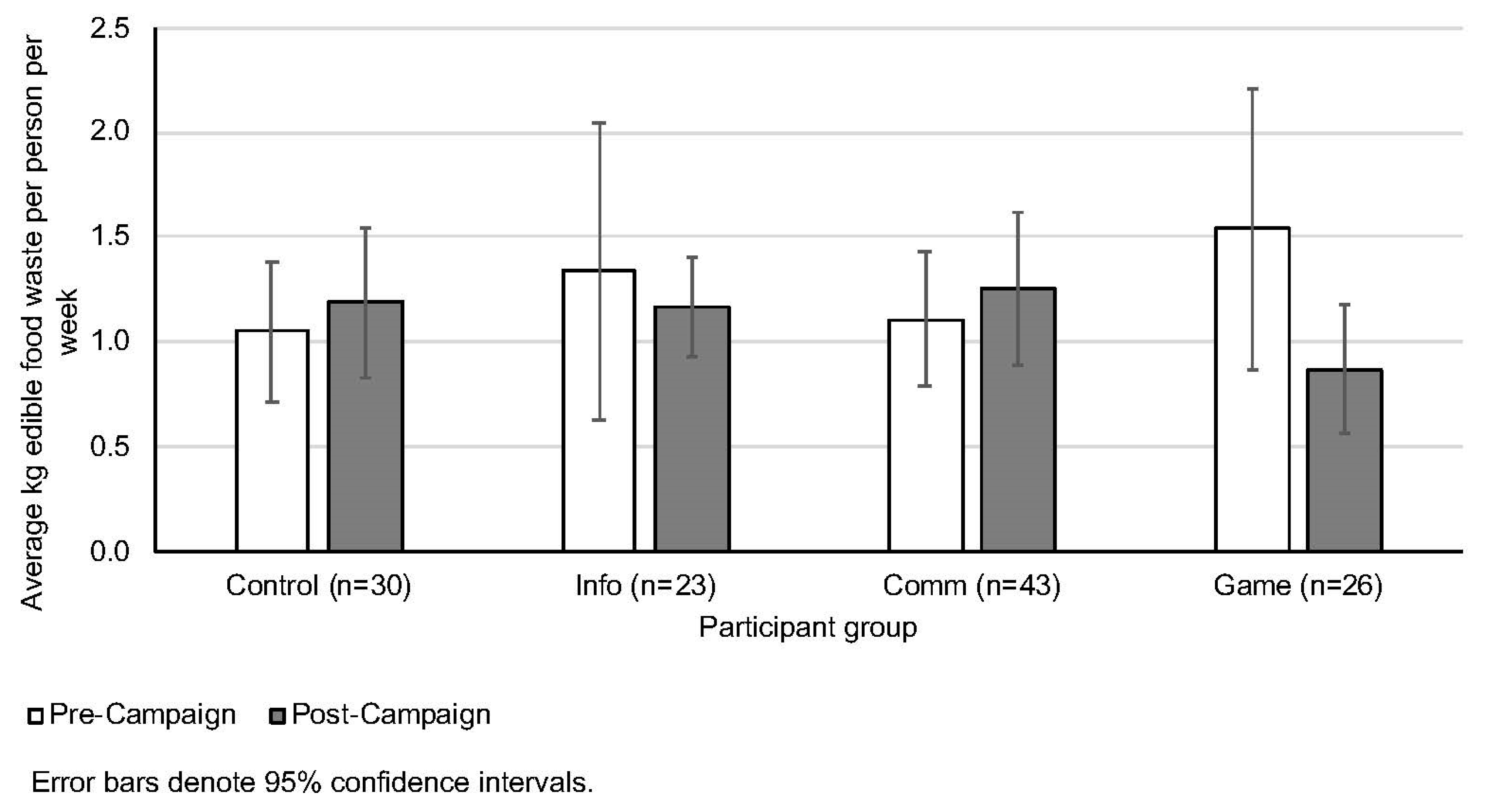

| Participant Group | Multi-Family | Single Family | Total |
|---|---|---|---|
| Control (Control) | 59 | 61 | 120 |
| Information (Info) | 90 | 50 | 140 |
| Information + Community Workshop (Community) | 60 | 59 | 119 |
| Information + Gamification (Game) | 60 | 62 | 122 |
| Total | 269 | 232 | 501 |
| Group | Multi-Family | Single Family | ||
|---|---|---|---|---|
| Pre | Post | Pre | Post | |
| Control | 59 | 36 (61%) | 61 | 33 (33%) |
| Information Only | 90 | 36 (40%) | 50 | 27 (54%) |
| Information + Community Workshop | 60 | 33 (55%) | 59 | 22 (37%) |
| Information + Online Game | 60 | 40 (67%) | 62 | 34 (55%) |
| Weeks Game Played | Audit 1 (kg/week/person) | Audit 2 (kg/week/person) |
|---|---|---|
| Frequent: 11–12 weeks (n = 14) | 1.37 | 0.67 |
| Infrequent: 0–10 weeks (n = 12) | 1.64 | 1.00 |
| Mann Whitney U between Frequent and Infrequent Game players | p = 0.200 | p = 0.030 |
| Learnings | Number of Responses |
|---|---|
| Best-before dates | 2 |
| Growing produce | 1 |
| Environmental impact of food waste + composting | 6 |
| Meal planning | 1 |
| Storage techniques | 2 |
| Recipes | 2 |
| Nothing | 2 |
| Reasons for Not Attending the Community Workshop | Percentage (n = 47) |
|---|---|
| Scheduling conflict | 47% |
| Childcare | 21% |
| Busy (no reason provided) | 17% |
| Did not receive info | 9% |
| Did not see the need | 6% |
| Other | 6% |
| No reason | 4% |
| Control (n = 69) | Information (n = 53) | Gaming + Information (n = 60) | |
|---|---|---|---|
| Decreased a lot | 8.7% | 24.5% | 23.3% |
| Decreased a little | 21.7% | 34.8% | 51.7% |
| Stayed about the same | 69.6% | 39.6% | 25.0% |
| Mann Whitney U Campaign vs. Control | p = 0.001 | p = 0.000 | |
| Mann Whitney U Campaign vs. Campaign | p = 0.311 |
| Control (n = 69) | Information (n = 53) | Gaming + Information (n = 61) | |
|---|---|---|---|
| Increased | 43.5% | 73.5% | 86.9% |
| No, already very conscious of food waste | 44.9% | 24.5% | 13% |
| No, food waste not important to me | 11.6% | 1.9% | 0% |
| χ2 Campaign vs. Control | p =0.007 | p = 0.000 | |
| χ2 Campaign vs. Campaign | p = 0.281 |
© 2020 by the authors. Licensee MDPI, Basel, Switzerland. This article is an open access article distributed under the terms and conditions of the Creative Commons Attribution (CC BY) license (http://creativecommons.org/licenses/by/4.0/).
Share and Cite
Soma, T.; Li, B.; Maclaren, V. Food Waste Reduction: A Test of Three Consumer Awareness Interventions. Sustainability 2020, 12, 907. https://doi.org/10.3390/su12030907
Soma T, Li B, Maclaren V. Food Waste Reduction: A Test of Three Consumer Awareness Interventions. Sustainability. 2020; 12(3):907. https://doi.org/10.3390/su12030907
Chicago/Turabian StyleSoma, Tammara, Belinda Li, and Virginia Maclaren. 2020. "Food Waste Reduction: A Test of Three Consumer Awareness Interventions" Sustainability 12, no. 3: 907. https://doi.org/10.3390/su12030907
APA StyleSoma, T., Li, B., & Maclaren, V. (2020). Food Waste Reduction: A Test of Three Consumer Awareness Interventions. Sustainability, 12(3), 907. https://doi.org/10.3390/su12030907






